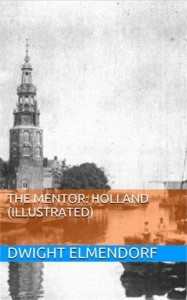The Mentor: Holland, V. 2, Num. 6, Serial No. 58 THE MENTOR ASSOCIATION ESTABLISHED FOR THE DEVELOPMENT OF A POPULAR INTEREST IN ART, LITERATURE, SCIENCE, HISTORY, NATURE, AND TRAVEL THE PLAN OF THE ASSOCIATION The purpose of The Mentor Association is to give its members, in an interesting and attractive way the information in various fields of knowledge which everybody wants and ought to have. The information is imparted by interesting reading matter, prepared under the direction of leading authorities, and by beautiful pictures, reproduced by the most highly perfected modern processes. The object of The Mentor Association is to enable people to acquire useful knowledge without effort, so that they may come easily and agreeably to know the world?s great men and women, the great achievements and the permanently interesting things in art, literature, science, history, nature and travel. The purpose of the Association is carried out by means of simple readable text and beautiful illustrations in The Mentor. The annual subscription is Four Dollars, covering The Mentor Course, which comprises twenty-four numbers of The Mentor in one year. Holland he history of Holland is a record of the unexpected. One might think that this flat country would have a story as monotonous as the land on which it is built, that it would be the last part of the world to be the center of fierce battles and bloody wars. Yet there took place in this little country, formed principally of the mud deposited by three rivers, the Rhine, the Meuse, and the Schelde, some of the most important deeds in the history of the world. The earliest inhabitants of this part of Europe are said to have been some of the barbarians that accompanied the Cimbri and Teutons in their expedition against Italy. The Romans, however, held sway over this district until near the end of the fourth century, when the Franks took possession and settled there. Later the Holy Roman Emperor Charlemagne extended his supremacy over the whole of the Netherlands, and under his successors a system of dividing the land among the vassal princes gradually developed. Thus the feudal system grew up. The situation of the country on the ocean and the mouths of three great rivers invited the people to commerce. Then, also, the big cities grew up and surrounded themselves with strong forts. In 1477 the Netherlands came into possession of the House of Hapsburg by the marriage of Mary of Burgundy, the daughter of Charles the Bold, with Maximilian, afterward emperor of the Holy Roman Empire. Their son, Philip the Handsome, was the father of Charles V, who subsequently became King of Spain. Under his rule the Netherlands enjoyed a golden era of prosperity; but during the reign of his bigoted son, Philip II, there began that apparently hopeless struggle of the weak people of the north against the haughty Spaniards, which lasted for eighty years and which ended in the establishment of the powerful Dutch republic. The great founder of Dutch liberty was William of Nassau, the Silent. Today he is revered by the Dutch as a mighty hero and martyr.
Mentor: holland (illustrated), the
Sobre
Talvez você seja redirecionado para outro site












